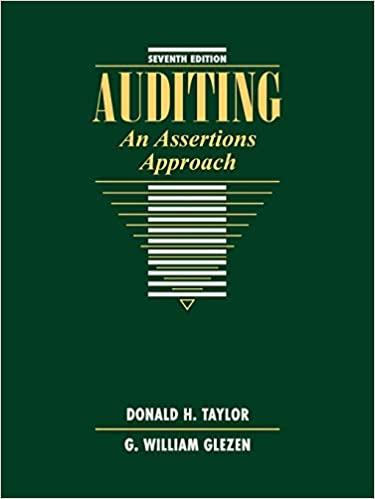For each of the ethical situations listed below, indicate (1) whether or not a rule of profes-
Question:
For each of the ethical situations listed below, indicate (1) whether or not a rule of profes- sional conduct has been violated and (2) which rule has been violated (if your answer to (1), above, is yes). Give reasons for your answers.
a. An auditor maintains accounting records for an audit client and estimates the amount of the bad debt expense.
b. An auditor's client begins litigation against her for deficiencies in audit work; the audit is continued.
c. An auditor's client has a material investment in a company in which the auditor has a direct financial interest. The investor has the ability to exercise significant influence over operating and financial policies of the investee.
d. The same as
c, above, except that the auditor's financial interest is indirect and is not material.
e. An auditor has a direct financial interest in a company that is not a client but that has a material investment in a client. The investor company has the ability to exercise signifi- cant influence over operating and financial policies of the auditor's client.
f. A partner in an accounting firm is treasurer of the local United Fund which is an audit client of his firm. This particular auditor does not participate in the audit of the local United Fund. g. The spouse of an auditor is employed as a bookkeeper by an audit client. (No manage- ment functions are performed by the spouse.) h. An auditor is an elected legislator in the city government audited by her firm. i. A CPA audits the financial statements of a municipal authority. Other partners in the firm own one percent of the municipal bonded indebtedness of the authority. j. A CPA renders actuarial services to an audit client. All significant matters of judgment on the services are determined or approved by the audit client. k. A CPA uses an outside service bureau for processing a client's tax returns. l. A CPA withdraws from an engagement when irregularities are discovered in his client's tax return. The CPA, without the client's permission, reveals to the successor accountant why the relationship was terminated. m. A CPA bases his fee for preparing a tax return on how much in taxes he can save his client. n. A CPA retains part of her client's records after her client asks for the return of the rec- ords. The laws of the state grant her a lien on the client's records as a way of enforcing payment of fees. o. A CPA in public accounting has an immaterial financial interest in a commercial corpora- tion that performs for the public services of a type performed by public accountants. The CPA is only an investor. p. A CPA's firm makes arrangements with a bank to collect notes issued by a delinquent client in payment of fees due. q. A CPA represents himself on his letterhead as both an attorney and a CPA. r. A CPA arranges for an audit client to furnish another client with supplies at a discount. She increases the fee to the client who furnished the supplies. s. A CPA in public practice serves as a director of a bank with which the member's audit clients engage in significant transactions.
Step by Step Answer:

Auditing An Assertions Approach
ISBN: 9780471134213
7th Edition
Authors: G. William Glezen, Donald H. Taylor





